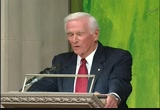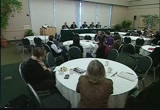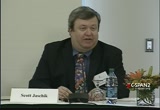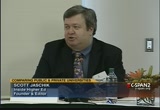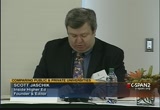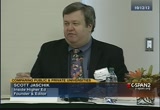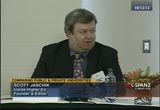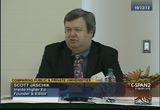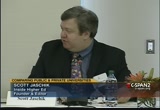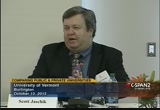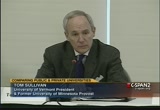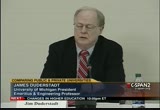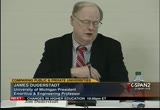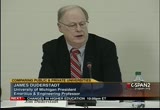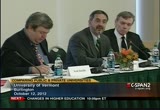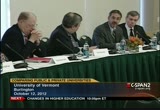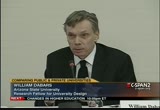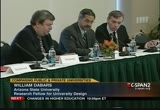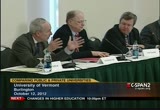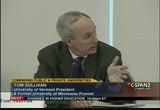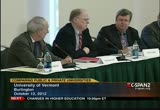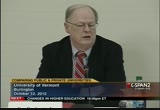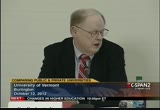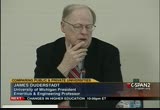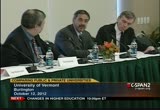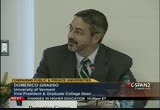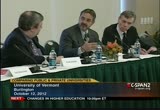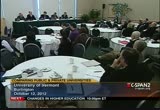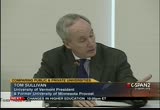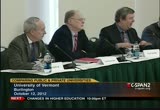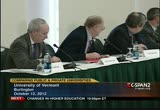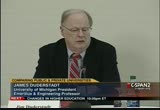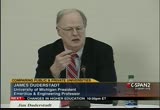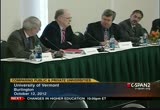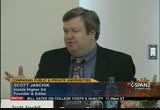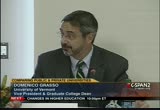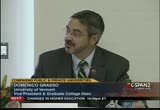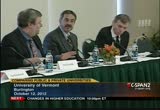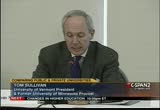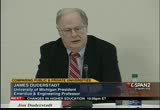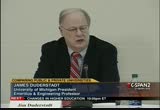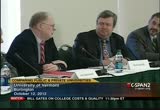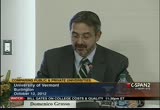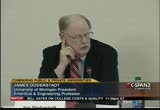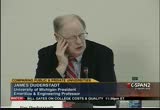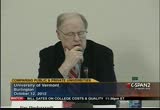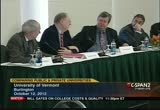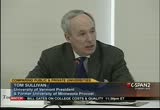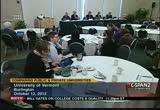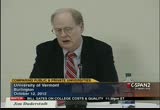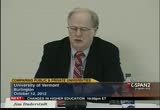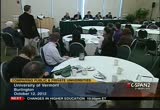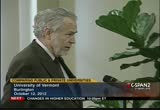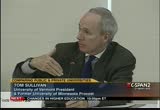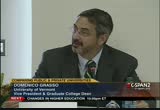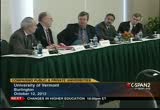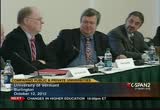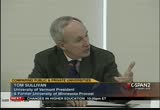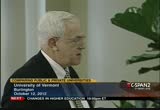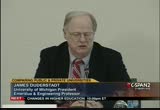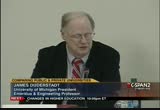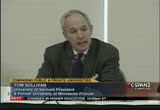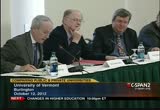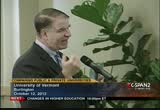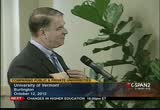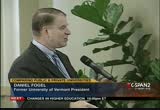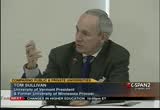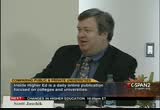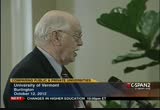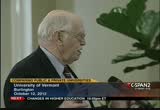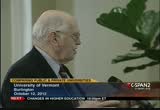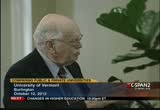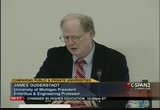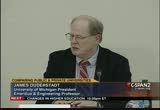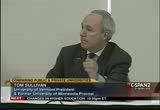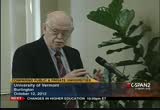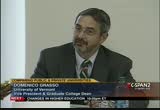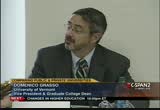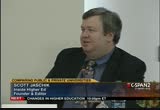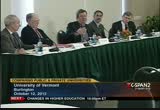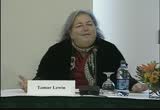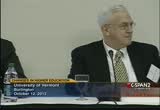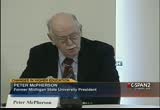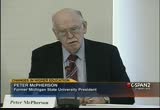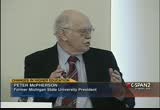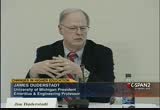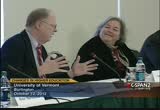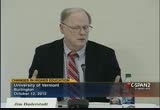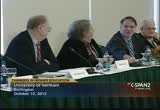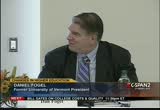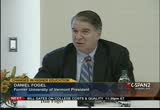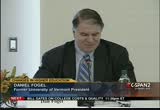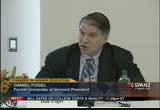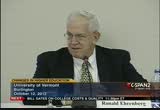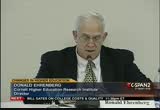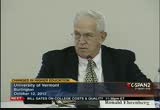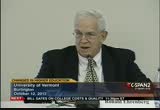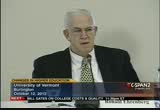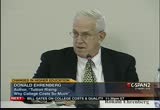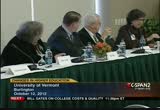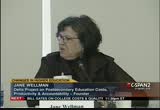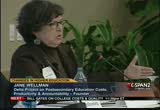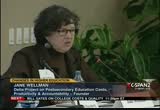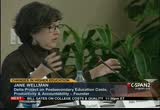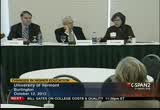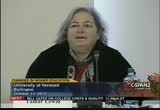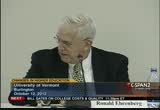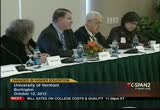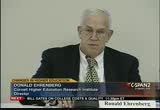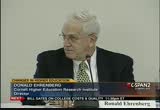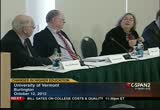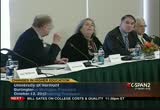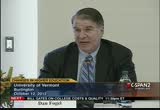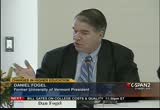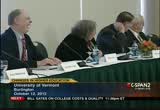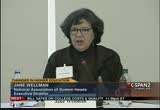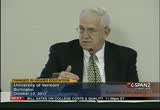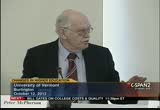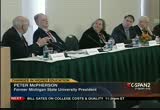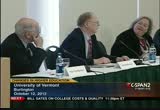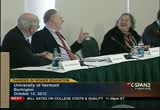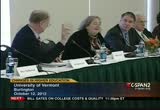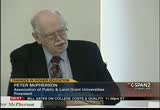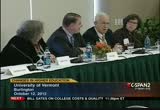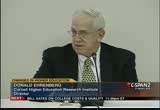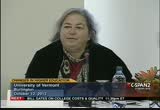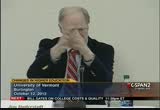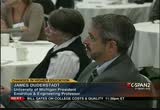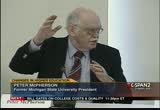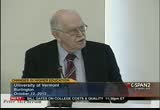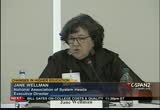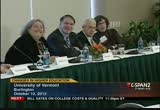tv Tonight From Washington CSPAN November 19, 2012 8:30pm-11:00pm EST
8:30 pm
8:31 pm
[inaudible conversations] >> welcome to the concluding day of the symposium on the future of public research universities. before i introduce the panel, just remind you all as you may see, we are being filmed for c-span. when we get to the q&a portion today, it is important to use the microphone and he will do better than i will. i should turn it up. thank you for your interest. i would like to introduce the topic that we will focus on this morning. then i will turn it over to a discussion with our panelists and get you involved. we are talking right now about research scholarships and the arts. at the public universities. in essence, what we are talking about, it is the faculty.
8:32 pm
the faculty and who they are, as well as the teacher faculty, including the graduate students. i would argue that we are in a time of huge challenge in the ability of public universities to recruit the best and retain the best and to sustain the kind of conditions that create outstanding scholarships, as well as teaching. it is little remembered today, and i find that when i speak to audiences in the public, 50 years ago it was not a given that the best programs or finance programs were private institutions. from much of the history, the very best would be in the public. people have heard it say that the berkeley physics department, although now, every year, people talk about whether it is in
8:33 pm
decline, think about the programs like history at the university of wisconsin from the social sciences in michigan, you have all sorts of areas where the very best did not necessarily teach and do their research. today we are at a period of significant disadvantage for public universities in attracting and keeping faculty. so there will be some figures on salaries. the average full-time faculty member at a private research university this year is earning a little bit more than $162,000. the average salary for an assistant professor at private research universities is 89,000, which is greater than the average for an associate
8:34 pm
professor at public universities, which is 82,000. it used to be that if you look at great research universities, dealing with the same cost of living, that many times the public paid more, or was at least equal. if you look at stanford and berkeley, stanford is paying on average $40,000 per year more to their professors. duke is more than chapel hill. chapel here professors earn less on average than those at wellesley college. here is vermont. i'm looking at the data, and middlebury case more on average than the university of vermont for every faculty range.
8:35 pm
you look at the figures for assistant professors, talking about the future talents, you have a situation where there are nine universities in the country where new professors earn six-figure salaries. eight of them are private and the one that is public is a medical institution on its own pay scale. the future here very much favors private on retaining talent. many choose their fields not because they want to get rich, but because there is a calling. it is beyond that. i spoke to a research university president of a public aau institutions here and we are talking about calendar offers that his institution has to make. he said that when he was lucky,
8:36 pm
he could raise enough money somewhere to match many salaries. but what he could not match with the conditions of the buildings and the ability to reduce the number of graduate students desired and to work with them and he also couldn't match a course reduction, where is a private research president can offer amazing packages that is very hard for many publics to match. as a result, we see excellence in scholarship and research. you see a lot of soul-searching going on in public higher education. trying to think about how private they can become. so many institutions have given up on the state. as i was reminded this morning, there are institutions like the
8:37 pm
university of vermont that have for years straddled a public and private relationship and have some characteristics in both. but there is no such history and talk of becoming more independent. it can be very controversial and upsetting to very many people. yet, too many leaders of public universities, if they don't talk about that, they feel that their excellence is in danger. see that there is a debate on giving up all state funds. the debate at the university of wisconsin madison for a chancellor tried to become more independent and perhaps that is not a president that is no longer in madison, wisconsin. these are very difficult issues to deal with. we have a panel of people who have been trying to deal with these issues.
8:38 pm
very briefly starting at the end on my right, we have time sullivan, who is the president university of vermont and he was peacefully the senior vice president at the university of minnesota. we have the university of michigan and trying to grapple with the future of research universities and public research universities. to my left we have domenico grasso, who is dean of the college here at the university of vermont and we have william dabars, who is a research fellow for the university of design in the office of the president of arizona state university. they have answered a number of questions in advance that i will draw from.
8:39 pm
when you ask about scholarship and research at public research universities today, should there be a different aspiration for public and private great universities, or is it the same? >> well, i think the answer has to be a definite no, there should not be a difference. i think the public, when they are supporting, regardless of what level, public institutions need to know that they will be of the highest quality and first rate and compete on the global stage for talent and faculty and also students. i think it is particularly important for public universities to ready those expectations and aspirations for quality and excellence and our students and constituency should not expect anything once. now, there is a cost as you suggested in your comments.
8:40 pm
there is a substantial cost to that. and i think that we simply have to make a better case than we have been making to our political and public constituents it is critical if this country is going to be in the forefront in the big global issues of today. it has always been, as you suggested in your questions, that it has been a big, public research universities that have led this country in breakthrough innovation and research. we simply cannot lose that investment. we have to make a better case with our constituents. >> higher education in america is intensely competitive and we compete for faculty and we compete for students and we compete for philanthropy and some of us also can heat on the
8:41 pm
football field. we seek the very best. we are different though and character. that difference is in recruiting faculty and students, particularly when we look at how we are supported, it can be a challenge. let me tell you a story that tries to illustrate this. back in the days when i was just learning how to be a university administrator, i had an opportunity to spend an afternoon with derek bakke.
8:42 pm
he then went on to say that institutions like michigan had one advantage over very private things that stood us apart. that advantage was a combination of intellectual span and capacity, they gave us the capacity to take risks and try new things in a way that many were not able to do. he noted that if harvard tried an experiment and it fails, everything was in jeopardy. a place like michigan, we can watch very significant activities. if we fall in on our faces, we pick ourselves back. we started to launch one of the major programs in human gene therapy. we built clinical trials phase and we found ourselves 20 to 30
8:43 pm
years ahead of the time. on the other hand, during the late 1980s, we were asked by several federal agencies to build a relationship in a project with their scientists, and that became the internet. in a sense, it is the excitement of large public universities and their capacity to take risks and in some cases change the world that gives us a certain edge in attracting attracting talent or perhaps we'll be private, even the vp salaries, may not have. >> scott, i think that you ask a very important question regarding publics and privates. but i would like to extend the contextual information about that. we are competing on a global scale. i think that the public has a sense of social responsibility that finds its roots in the land
8:44 pm
grant that many of the privates did not. i think that the publics may not be as well resource. and president james duderstadt made a good point about the fact that we are not trying to privatize, but we are trying to become self-sufficient on the privatization on the public side of the academic structure here. but i think what the bottom line is is that the public have because of their social responsibility to land grants and other state appropriations and connections, a sense of responsibility to serve a greater part of the population. and i think that it's not just the application do what they
8:45 pm
decide to pursue in terms of their research, but also how big they pursue it. the research issue is certainly going to be something that plays out across the academic culture. it will reach across the globe. >> public research universities produce something like 85% of undergraduates in the nation. the majority of the graduate students have something like 60% of research. it has been pointed out that the entire undergraduate student
8:46 pm
body of all the ivy leagues of the public universities, i think it is important for the public to realize that teaching is only -- i mean this is pointing out the obvious, but teaching is only one fifth of the discovery mission of the public universities and has a transformational impact on the quality of life and the standard of living. the list of discoveries that are coming out of our research universities, it is something that most people are not aware of. from lasers, magnetic resonance, the algorithm for google searches, breakthrough technologies that we take for granted come out of our public impact of research universities.
8:47 pm
>> so you all seem generally optimistic about the ambitions of public universities can have and i would like to push back a little bit. when i read the headlines and i am searching for news, i see public research universities are talking about selective excellence or cure the university of vermont, the aspire program. the idea that universities, they need to focus on a few areas and sacrifice what one might find at the top private universities. michigan could be an exception to the rule. i am wondering, does that limit where you can have research breakthroughs? does that say that we will only have it in some areas? >> i think the question has to be one of balance.
8:48 pm
and the right proportion that one finds in history and current circumstances. i think your question suggests the importance of differentiation and where we have great strengths and comparative advantage. obviously, that is where the investment should take place. there could be things that we don't have high quality or protective particular distinctiveness. perhaps we have to declare in a public way that given the constraining budgets that we live with, that we simply can't do certain things anymore. but i think that that is strategic and it also permits us then to go out and make the investments where we have our strengths. and where we have competitive advantages. perhaps, engage much more in the collaborative, research
8:49 pm
infrastructure by many of our universities and colleges. we do not do that particularly well. jim would know this from his experience. i am reminded of the great success in the big ten and the university of chicago. committee on institutional cooperation. over 50 years, those big public research universities have collaborated significantly infrastructure and technology and cores sharing over 250 courses are now being sure in and among those who simply have to do a lot more collaborative interaction with each other to be able to increase the field so necessary for the investments we are going to have those safety research opportunities that we have seen in the past. we cannot do this all along, individually, are you if you did
8:50 pm
it to her own their advantage. steve both see character as well as cultural character. him thought it amusing that if you contrast stanford berkeley, stanford is far and away the most public of the institutions. because of course we have to include the tax benefits that they receive, not only for charitable contributions, but for earnings on their endowment. so in a sense, our government policy right now, does have in place of higher education. in much the same way that as you said, 50 years ago, the culture is also an interesting feature. most deans are rewarded for the quality of the faculty that they were able to recruit. the tradition has long been that they recruit outstanding and junior factory and development within the institution.
8:51 pm
you generally find them making lateral appointments at the senior level by raising the public institutions. that kind of give-and-take tends to balance out. to balance that is the case, that while salaries, they may be somewhat higher, the survival rate is much lower. most tenured appointments are not made through the development of young faculty, but picking up already developed factories. those cultural and policy factors really shape the nature of the competition between these institutions.
8:52 pm
>> i want to follow-up on that issue because when reports come out, private research university presidents will issue a statement of support. i have yet to find someone willing to take the pledge. i am curious, should your private colleagues say, okay, we are not going to take advantage of this? >> several years ago, i tried to broker just such a dialogue. difficulty is the critical point of focus. they are the ones that did reward and.
8:53 pm
and an expectation has to be expected. in a sense, the quality of the private universities is heavily dependent on the public. to the to -- to the degree that our quality is this way, this interdependence is the issue that really has to be stressed. whether you can have a disarmament does discussion or not, the key point is that the public and private really has to recognize that they are heavily dependent. >> you feel that they take
8:54 pm
advantage? >> are you asking if they raise more attractive packages and do so in a way that takes advantage of the relative strength? >> well, i think that if you were trying to build the best program that you could, i don't see how you would not want to do something like that. you would leverage or resources to take advantage of the opportunity in front of you. i would like to say that i was personally in a situation where i was at a public university and i was made a very attractive opportunity. i eventually decided to go elsewhere, but i think that it is, if you are successful, it is not just that i want to be clear about this, it's not just
8:55 pm
private in and the public, but we have upward revision in this is part of the market system for which we live. i can't imagine that he would not want to try to play the best advantage you can over this focus. i do want to go back to one of the original questions. with regard to focus research areas. i think that different schools have different capacities on different scales. i do think that some schools in the university of vermont is an example, they can have specific pieces of excellence with the best programs across the nation and world. when jim was at the university of michigan, he produced a strategic plan. he charged each of the colleges and schools there.
8:56 pm
they can continue to grow and it is something that evolves over time. you don't think that that is what they're going to focus on for the rest of history as an institute of higher education. i think it is just a plan to take advantage of the resources that you have an institution and build strength and moving on to continue to do that. even harvard cannot build across all disciplines equally and not make strategic decisions. that is what they do. >> well, i think it is important to bear in mind that all public universities go through a period of fiscal crisis. the investment in education has
8:57 pm
been historic, and it was a mistake, had its legislative support reduce by the largest percentage in dollars of any public university, this has had an enormous impact in terms of viewer focus on the faculty. the decline in the percentage of faculty has been a huge proportion. there is something like 75% of instructional staff at public universities are not contingent academics. this has a long-term impact as well. which private universities can leverage to their advantage. >> may i interject?
8:58 pm
your question had to do with faculty. i think the competition is more severe today than what we might call the arms race on facilities . many of our universities, when the recession came in 2008, either had a hiring freeze that was substantially slowing down the competition that you were speaking out. but i am not sure that there is going to be an abatement of the increase of facilities of enormous costs, whether laboratories or other facilities , student unions, athletic facilities, and i think the real competition is in the facilities right now. high school students and their parents who come here are impressed by that. quite frankly. we just need to make a better case on why the fanciest and the shiniest may not be the best.
8:59 pm
given the cost and the trade-offs associated on where the investments are being made or not made. many of those should be made for more scholarships and financial aid to lower the problem of affordability in this country, as opposed to building more giant buildings that compete with their college next-door. >> i am in a position where i'm here story after story of all kinds of institutions. ..
9:00 pm
9:01 pm
sure, please. >> they represent the academic core of the university, of what justin envisioned as dan appointmented out in the chapter in the book he edited commemorating the passage of the moral act that we're celebrating the 150th anniversary of this year, and justin's vision was for liberal education as well as utilitarian and as the research university emerged drew from science and technology, certainly, science and technology draws more federal support, but without the humanities, and there is, just absolutely education trord --
9:02 pm
extraordinary work done in the humanities that informs our culture, and it's so pervasive that i think it's just not as producing what the technologies do. >> do you think the humanities are getting the short end of the stick or just jealous of the new building for the engineering college? >> uh-huh. i think there's no question they feel downtrodden rings but in reality, the fundmental purpose of the university is education, and there's a vocational focus right now, and the purpose of the university is prepare a stopt for the last job. it's for the arts, humanities, sciences as well, to give an
9:03 pm
individual the capacity to continue to learn, to adapt to change. we believe right now looking at our students that they are going to change not simply jobs, but entire careers many times during their lives. the careers will be longer than ours were, and, therefore, they need a much broader education in order to prepare them for that m i think that's one of the great frustrations in the society right now that they have a very short term focus and lose sight of that, but that kind of vocational focus permeates in colleges in certain kinds of ways in the humanities as a deal of concern. one variation on that that has to do with the arts. it's my sense right now that if you had a characterize the next stage of evolution of the society and our institutions, it might be more akin to the stages of the renaissance. the reason for that is the tools we have to create whether it's
9:04 pm
synthetic biology, artificial intelligence, manufacturing, involves a different kind of a mental discipline that's perhaps more familiar to the arts and humanities than it is to the scientists and engineers so their value as we shift into a society placing value on creates things that never existed before may actually prioritize the arts and humanities not simply within the university faculties, but within the curriculum in a way it has not for many decades. >> tom, how do you -- >> well, to the extent that, as jim said, our society is now driven with a conversation about the reason you go to college is to get a job, i think, it's -- our responsibility, those who lead colleges and universities, to make the case every time we can as jim points out, that that is not the essential purpose,
9:05 pm
and that we really have to -- it goes back to my point earlier about the right balance. it's really our responsibility to make sure that those new dollars and reallocated dollars are invested where the strengths and the comparative advantages of the colleges and universities are, and we have to make that case before our legislatures about the importance of centrality of the liberal arts, the humanities, of the social sciences, and if we don't make it, others in the university won't or can't so i think it's our direct responsibilities as presidents and chancellors to make the case for the liberal arts and the humanities. that starts with a conversation, i think, with the parents at home. >> is it a legitimate criteria, though, in evaluating opportunities and excellence, to factor in the availability of outside funds? that's what seems to tip the scales in favor or against the humanities because, obviously,
9:06 pm
the occasional neh grant is not going to equal what somebody could aspire to, land from the nsf or nih, and it seems like a lot of universities are not defining their excellence in part by where can we raise money? >> i'd like to just put something out there. i think that the use of funds to evaluate research stature or research prowess or the extent of research is a surrogate parameter. the funds are used to produce outcomes, and it's the impact of the outcomes that are consequential and should differentiate schools, not their ability to attract the funds because some funds are attractive, and they can be attracted from competitive sources, but they don't result in eventual impact. it's the impact we should be measuring. this is something the academy has not done a very good job in so far. we've used surrogate parameters
9:07 pm
and some schools have been able to use those to the advantage. i think that the humanities could make an equally strong case for impact as many of the sciences without the reliance on how much money they are bringing in to support their impact. i just want to say two things about the humanities. first, the humanities are critically important to the universities and to the future of the nation, our civilization, and the world. to do science that's or engineering that's not con tex chewabl -- contextualized within the human condition is a recipe for disaster. we've seen disasters from the 20th century that did that. we have to have hole liz tick education for the -- holistic education for the science and engineers grounded in the arts. the future of the research in the humanities also has to change. the human condition, human record is changing very rapidly
9:08 pm
as was said with regards to things like sip thetics, biology, added manufacturing, or artificial intelligence. what it means to be human is different now than it was in the middle ages, and the humanities has to address that, and there's a whole area of digital humanities on the fore front. research, itself, has to evolve at the same time, and i think as it evolves it will be increasingly relevant and germane, and i think the case that tom said eloquently that we have to make as administrators and professors will be easier as that evolves. >> picking op what was said about the understanding of the human condition, the academic culture has been moving towards a period of interdisciplinary convergence that includes the
9:09 pm
humanities, and applies science and technology projects often involve philosophers, legal scholars, economists, and these address the grand challenges that, for example, the national academy of engineering which professional can speak to at length. identify grand challenges that include stainability, health, reducing as a -- veal necialt, human well being, steanble action, sustainable cities. all of these embrace the entire spectrum of disciplines, and so it's -- it's short sided to give
9:10 pm
short thrift to the humanities. >> perhaps we have an enlightened panel here, but when you look at what's going on in universities, particularly public universities, maybe not the flag ships, institution after institution that announces we're going to be an international university, but then eliminates half of the foreign langs. we'll have room for the occasional philosopher in the projects, but you don't see it. i got all these plans, and you don't see them included. we touched on the role of the faculty like the track, adjuncts, and the issue which some of you touched on in advanced questions of retirement policy, and as you're looking from the perspective in managing
9:11 pm
the university to encourage the right flow, what do you see as the personnel policies resulted to the faculty that need bolstering or changing? >> scott, i think it starts with how it operates on the ground, and you need principles that inform and shape decisions on where the investments will be made, and i think the principle criteria has to be incentives. we know the human condition in some way differs, obviously, with people, but in some way is motivated by a reward system, broadly defined as we have it at universities whether that's prizes or awards or salary or compensation, retirement benefits, ect., and so i think the way, and the only way you
9:12 pm
can get at that, the right know, as you said with the hiring and retention and retirement patterns is to ensure your budget in operation actually has the right incentives that are very positive and encouraging for faculty to progressively be able to advance through their career, but if you don't have the right incementive, you're not going to get there. >> this is a challenging issue. it was quite clear that the impact of the recession, collapse of the market in 2008, had -- was great on faculty and defined contribution retirement programs. they lost typically 30%-40 #% of the assets. a lot of that is recovered, but their coved --
9:13 pm
confidence is not recovered. approaching the date they normally choose for retirement, they wonder could this happen to me once again 10-15 years out? they delay retirement. at the same time, there's young faculty looking for permanent positions. in part, it's due to federal policy. there's been -- the enormous expansion of the doubling of the population with the nih budget created what is called the la guardia effect with a large number of posts going from one to the other looking for a runway in a university to land in. many of the public universities found that the easiest way to patch up holes is to expand enrollment, but hold the faculty size constant so they are increasingly dependent on part-time faculty. now, the majority of those, i think, even in most public flag
9:14 pm
ships is dope at the first two years by the faculty. these are frequently talented teachers, may be talented scholars looking for a position to open, but we don't know how to grapple with it yet so i guess i'm a little bit more concerned that the issue of retirement, the issue of research funding that seems out of whack with the needs of the students, advanced students at least performing the research, and our increasing dependence on part time faculty that could be outstanding teachers and have to be treated with more respect and more security within institutions are issues most of the institutions have not yet dealt with. >> i want to ask a follow-up question. because you're a retired president, i'll pick on you. >> yes. >> if you could snap your fingers and restore the mandatory retirement for faculty members at a certain age, would you? >> probably not, but what i would do is pay much more attention to how you handle
9:15 pm
faculty retirement by recognizing that for most faculty, not only their intellectual life, but their social life is very much wrapped in institutions, and while private institutions, i think, tend to be more sensitive to this and find ways faculty and retirement stay engaged with the campus, all too much public institutions open up the door and show them out. i think more sensitive to that is probably the much better way to accommodate. furthermore, the faculty, even in retirement, are still outstanding scholars and teachers, and they have skills that are of enormous benefit to institutions if used correctly. >> i think that the fact that we have moved from a retirement plan that was secure as jim said to one that is at risk in the market is something that has
9:16 pm
impacted retirement decisions around the country. it's not just faculty members that are suffering by this. everybody seems to be working longer, and i think we have to find ways to create a situation, an ecosystem where the faculty are making the decisions themselves through incentive plans as tom noted. you want to have a situation where the faculty are looking out for the best interest, not just of themselves, but the units they spend a large percentage of the time in realizing their students and the institution are going to be at risk based on their decisions as well. i think if you develop incentive plans for that, the faculty will always do the right thing. >> no, i mean, i think that all of this should be appreciated in the decline of the support for higher education and just in
9:17 pm
general terms. that's the background that's driving, for example, the decline in tenure. >> i want to shift to the entry point, academic careers, graduate education, and the great public universities, our great trainers of new ph.d.'s, and, jim, you eluded to the necessity of many new ph.d. and scientists and multiple post docks. concerns in the humanities about people who have adjunct careers or adjunct life. should ph.d. programs be graduating as many people as they are when they -- when there are not jobs for them? >> to respond to that, you have to recognize there's enormous difference among the disciplines in both the way that education occurred and in the motivation of students. in science and engineering, most have no interest in academic
9:18 pm
careers. they are interested in research to be sure or to use research as a tool to move into other areas like management eventually, but they do not necessarily intend to enter the faculty. furthermore, it's the case that since the nature of education in those fields involves an apprenticeship working side by side with a faculty member their prodepress is assessed on a continueed basis leading to a much shorter time of preparation, typically four years, five years, and in some cases shorter than that. it's in sharp cop trass by medical research in which in reality the ph.d. is simply the precursor to the real education at the post doc level, and that experience is one that
9:19 pm
is kind of indentured servitude. they are the backbone of biomedical research and my grant workers moving from one dock to another to another. once again, i think a significant fraction of post docs are not seeking academic positions, but the point is they have to go through the process. in sharp contrast, the humanities, in which their expectation of the monograph or book as the outcome of the dissertation, they don't have the direct relationships with the supervisors, and so the length of time that the garage watt education can occur over is much longer, ten years or more. for most students, they are interested in that, and that's where the real crisis is at this point. the balance between the number we're producing, the length of time it takes to produce them, the attrition rate while they go through that process, and then the absence of adequate
9:20 pm
opportunities for them to move into academic positions. i think serious reconsideration needs to be given to how to handle it. the time thing i would say is that the principle way we support graduate students in the universities through garage watt teaching assistance or garage watt research assistance really do not have the mote vives, although we -- motives, although we claim it does, but cheap labor in the classroom and laboratory. back in the 60s, when i went to school, the principle form of support was in training shifts and fellowships. when we shifted over to labor for the principle way to support it, i think we lost our way in motivation, and that, also -- when you determine the size of the student body, the graduate population by the number of graduate students you need to teach courses or the number of students in the laboratory, you lost the way about what the real purpose of graduation is. that needs to be considered by universities and the federal
9:21 pm
government in providing support to garage watt education. >> scott, i think it's healthy for a university, periodically to examine and re-examine the size, the scope, and the quality of the graduate education. there's an link between the quality of research and the quality of the graduate students and graduate program, and if one looks at history here, this is cyclical, and we have to figure out where we are on that transformation, and some call it the new normal, and i think it's very healthy. here at the university of vermont, we actually are engauged right now, looking at the size and scope of our garage watt programs. our vision is one of being a preimminent, small research university that's a research university small in size, and that requires us to look at
9:22 pm
whether or not our size and scale right now, perhaps, is too small, but i also think faculty and administrative leaders have an obligation to look carefully at the market factors. part of the implication, i think, of your question, and that we make adjustments along the way where we see big demands and industry or the academy for the talent that comes out of the graduate programs. i think the periodic strategic review of the programs is absolutely essential. >> i want to open it up now to the audience. to invite you to ask questions or elaborate on some of the themes. again, even though, i, and the panelists know a number of you, because it's filmed, use that microphone and introduce yourself before your question. you're all invited.
9:23 pm
>> i'm burke wilky with the university of vermontment i don't know if the panelists are aware of this, and i heard it and i wanted to verify it, but i understand post-2008 recession that in the job market, the individuals who were positioned to alter their careers, find new positions, find other jobs w those individuals who were liberally arts educated, and not those train for specific disciplines. it seems like that, in itself, says when the economy's contracting, there's a competitive advantage to having this kind of education. >> you know, it's struck me one of the students that apple would rather have liberal arts background than computer science or engineers because they view
9:24 pm
them as much more adaptable, capable of adapting to change. during the late 1990s, the higher education forum conducted a study of ceos and what they sought from college graduates, and while they expected some skills that might have made it relevant, what they were really after was individuals, first of all, that were committed to continue and had the capacity to continue to learn that could not only adapt to change, but drive change, and could adapt to an increasingly diverse world in terms of culture, characteristics, and so forth, which in their sense, really defined the importance of a liberal education as the background for this. i mention i irritated my colleagues at the national academy of engineers last sunday by giving a major address challenging them to go through
9:25 pm
the flex process, and realize an undergraduate professional degree makes noceps whatsoever in the world as we know it. in michigan right now, the last -- aside from engineering, the only other undergarage watt program we have is dental hygiene, and it's about time for engineers to grow up and realize to adapt to change, they need a liberal arts undergraduate degree before they enter the training for engineering. i think it reenforces exactly what you found. >> you know, i just wanted to say that while you're absolutely right about the data, particularly over the long term, there's a lot of evidence that in the short term what parents want is guarantee of a job. we just did a survey of admissions directors found more students than in the past ask questions about jobs that result from programs, but twice that, they reported parents were demanding it.
9:26 pm
i'm hearing particularly from liberal arts colleges attracting students who they are convincing to end roll and telling them their parents don't want them to be particularly english majors or whatever, and i say this as a proud history major, and, you know, who is not a historian, that there is -- actually, i would also criticize my own field of journalism in this regard in that you can't go a week without reading a publication about the philosophy major working as a baa reese that. that's a theme the press loves to talk about, and it ignores the evidence even though things are really bad right now, college graduates are doing better than noncollege graduates, liberal arts are getting jobs and doing well, just nobody's doing particularly well right now. >> i feel obliged to suggest, as well, that perhaps when i talk about the liberal arts education
9:27 pm
for the 21st century, i think we need to do what happened in the mid part of the 19th century where other things like history and modern languages were added, but in the way of technology because i think that the degree to which technology reshapes our world and lives is something that needs to be much better understood, and not necessarily engineering, but technology itself, its implications to assess it, how it impacts the human condition has to be an important part of the 21st century liberal education. >> thank you. david with aplu. back to the question about universities emphasizing their technical science areas. it appears to me that part of the reason for that is the crisis in funding, that the
9:28 pm
universities have. it's very difficult to sell to the states, things that don't relate to economic developments in some sense, the attraction of industry. i'm not aware of a university that is in its campaign for additional state funding or maintain state funding more likely. that used humanities as the selling point, use these technical things so i wonder, i mean, i don't want to suggest universities don't have a leadership role to suggest that the humanities are important to society, but i wonder if we are not captured by the funding potential that leads us to push these other spires? >> dave, that was my point earlier about it is our responsibility as presidents and chancellors and provosts to make the case for the humanities and the arts, and the social science, and we have to do it in
9:29 pm
the public institutions when we're before our legislators and before our major donors, which is the other very important piece, and if we don't do that, it won't happen because of the societal trends that you and others have talked about today so it's all responsibility. if we believe that the humanities and liberal arts are central to the core of the universities as we do here at the university of vermont, and i know my colleagues share this, we have to make the case. it's our speedometer, and if we don't make the case and be successful, shame on us. >> nip else who wants to speak to that? >> i totally, obviously agree not just with tom, but my boss. [laughter] on this particular matter, but the humanities are incredibly indispensable in today's society when we're -- when we're talking about economic development. if you look at short term
9:30 pm
economic development without considering the humanities and social sciences, we'll end up in trouble here, and i think we learned lessons from how we did things in the past. it will be easier to make the case for the importance and relevance of the humanities and the social sciences as part of what is being contributed to economic development by universities. >> absolutely. i think it's important for the public to realize that even these scientific literacy or quantitative literacy that is required of citizens in a democracy is something that comes out of a context of the spectrum as liberal artsing inning -- which includes social
9:31 pm
sign tisk perspective. i mean, there's reference made to critical thinking skills, but credittivity, the entire -- just why employers do value liberal arts garage watts. >> again, not to be a downer, but i think that it is important to note that there are a lot of states where these arguments are not tearing the day or even coming close. you know, we've seen in the last year a pretty strong political attack on the university of texas in austin which would make most people less of top public universities with a range of great programs where think tank close to the governor did an analysis of the professors by a very basic rubric judging grants brought in. now, it's just not surprising that some disciplines did better than others, and that -- it
9:32 pm
would be a place that has many outstanding departments in the sciences and in fields where there are outside funding opportunities, and many outstanding departments and fields with minimal outside funding opportunities, and this analysis is, in fact, going on in many states and in ways that disadvantages those disciplines, you know, one of -- to the point about apple, one of the steve job's last big speeches was just about that point, but that gets less attention than the focus of, say, the gates foundation which is very much on training people for jobs. there's a strong pull in political society against the trends or ideas talked about here. >> let me comment for a moment because i think to make the
9:33 pm
arguments, you have to be sensitive to the political realities. when we put the title on the national academy study of the future of the research university, while we followed along with the idea that prosperity was important, i added the words prosperity and security, and the reason for that is we have a congress right now that certainly gives lip service to jobs, but they give money to security, okay? look at states right now, the simplistic approach is to say that we're going to spin off companies, create the next google, so forth and so op, we made the argument for a long time, and it's beginning to wear out. you can make other arguments. for example, if you get really sick, the only place you're going to get cured is at our hospitals, okay? well, that has an impact on people. we find what gets traction,
9:34 pm
interestingly enough, is, look, institutions are global in character. we not only access international markets for wealth, but we access international markets for human talent. we're one of the few institutions that can attract the best talent from the around the world that benefits the region. you have to kind of tailor the message to, you know, perception and the reality of the times, and that's a shifting requirement. >> scott, to pick up on jim's point, and as a practical mapper, the way we do that and haved too it to be successful is broipg the political leaders, the spokespersons for different constituents to the campus to see the great teaching that's taking place in the humanities, for example, or to walk them through our labs or our hospital research facilities and show them how this kind of creative faculty activity and research has a direct impact so the power
9:35 pm
of the narrative, but you can't do that through press releases or glossy brotures, but -- brochures, but bring them to the campus to show them. that's very powerful to public policymakers. >> and the culture understanding and sensitivity and linguistic ability for the united states to navigate and in a global knowledge economy comes from the humanities and liberal arts. >> ron from cornell university, economics is supposed to be the dismal science, not journalism. i want to try to tie the discussion to what we talked about yesterday. i think one of the major problems that public universities face in the years ahead is this system of
9:36 pm
government with political appointed trustees. when don randall was the provost at cornell talked to me a lot about managing not just the people below you but the people below you. one of the problems we face is managing the people above them and trying to convey to the trustees way is of academic value and what is important. the trustees, private universities, who are all garage watts of the universities who love the university will buy in veryings very quickly to the arguments that the presidents make about the importance of the arts and sciences. now we add to the responsibility of the presidents of the publics, they have to try to do the same thing with a board that's politically appointed and constantly changing. it's a major problem, but i think that president sullivan had it exactly right as to what they should be doing.
9:37 pm
>> well, let me comment on that al little bit. in july, the regions of the university of michigan approved the budget for ann arbor campus. they approved it on a 5-3 vote, one vote the other way, and it wouldn't have been approved. $6 billion a year, the size of which i'm a chair of the board of directors' governance committee. the university of michigan is infin nitly more complex, it's a global institution, but i could not imagine in a thousand years picking a board to govern that would have accountability in the way that we pick governing boards for the universities today. this quaint tradition that dates from the colonial years, and i guess it comes from the scottish tradition of having lay boards oversee extraordinarily complex
9:38 pm
institutions is a recipe for disaster, i believe. the best practices of corporate governance, not all of corporate good afternoon nans, but -- governance, but should apply to public universities because they are as important as corporations. you need people on the boards who understand the nature of the business. that does not mean they are on the faculty, but have to understand what universities do, how hospitals operate, how very complex research organizations function. the political environments in which these institutions work and so forth. i do believe that private trustee boards have flex the, capacity to add those people, but the lay boards of almost all public universities in the country are politically determined. most by appointment. they don't have that characteristic so i think they are flying blind. i think that's one of the great challenges we've got to address, but having fought this battle for the last several decades, i
9:39 pm
don't have a clue op how to do it. >> ron, your point is well made, and i think this is a place, a tipping point, perhaps in the country where we've seen the very significant decrease in state funding, yet, i have not seen, in many institutions or states, where the number of public trustees have gone down accordingly so one might want to ask the question about proportionality. proportioned to the investment the state makes and who is making the decision on the board. we here at the university of vermont have a wonderful opportunity to, perhaps, lead the conversation. the governor a year ago commissioned a committee to look at how do we strengthen in vermont the relationship, the partnership between the university of vermont and the state? a very positive affirmation and approach, i believe, on his part, and the report came back and said that with 25 board of
9:40 pm
trustee members at the university of vermont, maybe we need to rethink the relationship and the proportion in light of the substantial decrease in state funding. they get 5% of the budget from the state which in a report indicates that's the lowest funding for a university per capita at this campus, we have an opportunity, i don't know what the result will be or what the appropriate balance should be, but there's an opportunity because the governor wants the discussion in the state about who are the trustees and who
9:41 pm
should be making the decisions in these conversations. maybe vermont will take the lead again in the conversations. >> dan fogel, university of vermont, and i came up to say something else, but end to comment on what president sullivan said as well very quickly. i found in my nine years at the university of vermont, all appointments added value, and we saw yesterday with our discussion, what strong and important values and understanding they can bring at the board table. the problem is precisely what jim touched on, though, and it is a question of proportionality as tom said. we have nine private trustees on the university of vermont board, but we cannot determine skill
9:42 pm
sets that the other appointees of the legislature and the governor bring to the board to meet the needs of the board in a range of areas from academic and strategic issues to audit and compliance and risk management and the like, and it's there where we have to emulate, as jim says, the best practices of the boards. having left the presidency, i'm now a profession of english, and i wanted to just comment very quickly on the discussion of the humanities as jane wellman said yesterday and scott said drawing on the survey of admissions directors inside higher education, ed delivered to us last week, parents care a lot about whether their students find jobs. i will say as the father of a
9:43 pm
ph.d. candidate in english, parents care about whether their graduate student children find jobs as well. i think to -- i wrote the chapter in the book after which the conference is named, price on cross roads, and i want to flip it that we as professors aft humanities and all the discipline in the university have an obligation to keep students' eye on the ball that there is a life after the university. i gave my students, when i was president, in an honors seminar here called "screening the modern," a terrible tongue lashing for half hour when they complained that isn't this is course on film? why grade us on our writing? the tongue lashing went right to
9:44 pm
making sure that they knew when they entered the work force or sought to enter the work force, every time they wrote something, every time they answered a question from the boss, how's it going, they were taking an examination. they needed to pass with flying colors. not only for their sake, but to make sure that people knew that the graduates of our university were skilled communicators. >> i'm a grad student here. talking about internationalization, how can you ensure that such things as a diversity and equal opportunities and tolerance are in place in the relationships among faculty members, staff, and students?
9:45 pm
so, for example, i had an experience when i was -- my professor because i'm not an american and basically because of my origin and nationality. focus more on relationships between a student and the professor and not about students and students because it's going to be the whole different story, so, thank you. >> well, i think it starts at the top. with regard to leadership and the modeling of what we call here at the university of vermont, a document called "our common grown" which is fundment tally based on respect and civility in our discourse, even though the university is one that should have robust conversations about all of the great issues of the nature and
9:46 pm
meaning of life that we talked about earlier. it has to be dope in a very respectful and civil way, student to student, faculty member to student, and faculty member to faculty member. all of us are part of the community, and i think every day presidents and chancellors and provosts and deans have to model and emulate and talk about the common ground we share and the goals we have for each other and one can only do that by listening to each other and learning from each other and working together to move the institution sphward, and i think -- forward, and i think it starts from the top, and when you see it, that deviating from that culture, you have to call it out. >> i was going to say an interesting change this higher education right now has to do with international undergraduates.
9:47 pm
america's great research universities, public and private, have long had large populations of international garage watt students. likewise, most american colleges and universities had a lot of institution, not always successful, but a lot of discussion about intergroup relations among undergraduates, but a lot of that has been about american undergraduates of different groups. for a variety of reasons, some of them, educational, some financial, we've seen a huge shift in recent years where american universities are recruiting many more international undergraduates, and i don't think they've always talked about the issues related to that. two recent stories that struck me of concern that we did. one, there's a very interesting study asking international undergraduates if they had significant friendship among american students, and very large numbers said they did not.
9:48 pm
we often did a story on their welcomeses that have sprouted up at ohio state and the university of nebraska, and they are called ohio state haters, nebraska haters, and these are websites where the people are anti-hate, and they go to the twitter feeds of undergraduates, and they find a racist statement, and then basically call out the students who made them by publishing with the student's names, did you know so and so said this? this is for all kinds of hate, but a remarkable number of commentings on both universities' websites are actually about asian students suggesting a real lack of tolerance or let alone true incollusiveness for populations, and i think that there is a missing part of universities
9:49 pm
efforts at promoting toller ranges and diversity is the study of intergnarl -- international undergrads that changed the dynamic of many american universities. >> peter mcpherson, i very much agree with the idea of the humanities being a core part of the university, of course, and i resinate with the argument that, particularly large corporations, are more interested in the extremely bright humanities major than the finance major, but i think that it's -- that's a limited group of students. when i was at bank of america 20 years ago, involved in hiring some folks, you know, we really wanted the extremely bright
9:50 pm
economists, really great, or even the philosophy major, but they really had to be extremely bright and preferably from a very high ranking school. we make that argument often, but that's a fairly limited pool of percentage of the humanity garage watts. if you don't have a b-plus average, you're not in the group at all. go for the finance major, and, in fact, you really don't want that philosophy major for that first job. you're training them for the second, third, whatever job so i think to some extent the argument for the humanityies do
9:51 pm
you want hold up for the broad group of people, although we often make it. i think what parents and students, it's not just parents that want jobs. it's the students, and the way to get that first job is to know something concrete that the employer can use. now, i grant this is not just a skills training program we're in, but you've got to know how to write, to speak, to think, and i think a lot of our problems is that we graduate many students that do not necessarily do that well, and if the humanity majors, and they do not do that especially well, then they got trouble so -- and they can't necessarily prove they do those things well as they try to get jobs. earlier, it was said, i think,
9:52 pm
you, jim, talk about the need for computer skills. my guess is that if the humanities majors, a major would really help, some sort of certification, that shows certain skills. i think that we have not fully grappled with how to deal with our desire, our feeling that we need to have the humanityies as a critical part of the university, and we need to have the numbers, the students take the degrees. we believe that, but we have not grapple with how we get the folks jobs. they are not going to get it at the big corporations unless they've got very good grades. we can't necessarily, so far, it's not easy to establish. they got the skills, especially if they don't have the good grades so i wonder what you think of all of that.
9:53 pm
>> >> let me comment. when i think of a liberal education, i don't necessarily think about a major in the humanities. someone can major in biophysics or even today engineering and still have a very liberal education background. >> right. >> i attended the school for lost boys in new haven, and i had a degree in electrical engineering, but i took more courses in history, philosophy, psychology, always used to say the most valuable course i took was in child psychology because not that it taught me how to understand students, but how to understand faculty, you know, stimulus, response, reenforcement, so forth. [laughter] the first thing is the liberal education, i think should be a goal for all students regardless of what they major in. if they pick up ph.d. programs
9:54 pm
along the way and english, fine. second thing is we have an era in which education is truly lifelong, and i think that's incumbent upon us to think much more strategically if someone is spending a significant fraction of their time, estimatings 20% of the time or more throughout their lives learning and relearning and readapting, then what's the best way to use those early years? okay? how do you prepare them for that? i don't think we thought that through. i think what -- we heard yesterday, university students, they have a shopping mall approach to education offering in the mall whatever they want to teach, but they have not thought about it strategically. you know, the issues you put out are important, but i think you need to look at them within this broader context of how do we really prepare and then use those years to prepare someone
9:55 pm
for a lifelong experience and need to learn? not an easy challenge. >> peter, i would also add that as you well know, the advent today and higher education is turning towards many more opportunities for internships and co-op programs, which is a way for these students to get that additional, perhaps out of the classroom experience during the summer or perhaps on a leave for the semester. i think we're going to see a lot more of that bridging from the pure academic discussion and in the classroom to the practical skills development and working collaboratively which is so important through intern opportunities and co-op opportunities. these don't have to be just science or engineers, but placing liberal art students into pathways and into making connections into the network that helps with that job. >> as you know, that takes
9:56 pm
special effort because that's where we have the most problems in our university and gaining interning. they work fine in hospitality oring thing -- or accounting or areas close to being the job market. they are hardest -- internship for history major is a real challenge, but i agree with you. i mean, i think that what you and jim both said makes sense. i'd like the idea that you're both getting into it more deeply because i believe that there's a substantial group of undergraduate humanities majors. i think liberal arts education certainly needs to include science, by the way, of course, jim, but humanities majors who -- who, if -- that are not extraordinarily good students. they are reasonable, but not extraordinarily good students, that is a real job challenge, and we've got to figure out how
9:57 pm
to deliver on that or help them deliver because they go to school in part because they hope to be employeded. >> i wanted to comment on the perception that corporations may have in hiring humanities educated student is a sound investment. a lot of the corporations hire from select schools. >> right. >> so they are hiring students from schools that have undergone a process from talent from the start. look at the select schools, liberal arts schools in new england, across the country, or the ivies, they make up a small percentage of the student body there so if they solicit
9:58 pm
employees from the schools, they hire more humanity students, but it's not necessarily that the humanities provides, alone, provides better training or education. i, as -- i spent a great deal of time at smith college when i started the engineering program there, and i found that all the students there were brilliant, of course, and that the course in the humanities were as rigorous as the courses in the sciences and in engineering, but that what we were striving for there, and i think that many schools are striving for it now are holistically educated people that understand the humanities and the sciences, and i think in this century that you are going to be shortchanging yourself if you hire individuals that are only trained in humanities that can write well, but have not been trained in quantitative thinking because they may get that first job, but they limit
9:59 pm
themselves. one of the thing, and i just want to say this because i've been dying to say this is that for engineers, one of the main reasons engineers go -- engineer students go into engineers is because there's pressure to get the job; right? we have misguided engineering students for many years because we tell them, come to engineering to get the first job when we should be telling them come into engineering so you can go out there and create jobs. it's -- this is something we have not done well in engineering is to teach the creativity the integration with humanities so engineers do not think about where to get the first job, but where to get the first job and make a difference and create more jobs. ..
10:00 pm
10:01 pm
require students regardless of the majors to read a lot and write a lot and then thinking about the discussion today about public versus private and a scholarship and teaching and i think one of the big changes recently is that private institutions have been much more successful protecting things like classicize and it just goes logically that if you are teaching 15 freshmen to write you can find a lot more and meaningful grade papers given 35 freshmen to write or 100 freshmen to write and i was at an event recently i was sitting with a smith college professor and a berkeley professor and they had the same class load, but the smith college professor had about 10% of the students as the berkeley professor, and the discussion is about what that
10:02 pm
enables one to do and there are some questions about the sacrifices in public about because they've lost positions how that carries over into things like how much do you write. i am afraid that we are out of time but i hope that you'll join me in thanking our excellent panel in dealing with these challenges. [applause] >> more now from the university of vermont forum on higher education. over the next hour and a half a look at the cost of college, adult education and online courses. >> thinking about this title that sounds nice, not exactly the choices press office or crossroads.
10:03 pm
why don't think we are at either one. making the road sign i think it would be steep hill change gears or sharp curves ahead or maybe i am now thinking pavement ends rough road ahead, but things are definitely changing and last night we heard bald say -- bob say he thought they had become ungovernable coming and it seems like there's actually some evidence for that. and we have a great panel to discuss it starting with jane wellman, the executive director of the national association of system heads and the founder of the delta project on higher and financing costs. next to her is ron ehrenberg the director of cornell higher education research and a past trustee of cornell and a current trustee of the state university
10:04 pm
in new york daniel fogel who convened oppressiveness lacrosse read symposium in this past president of the university of vermont. jim duderstadt who is the president an emeritus at the university of michigan for the michigan people together although there is probably some competition there, and pete mcpherson who is the head of the republican land grant universities and also a past president of michigan state. so i think governments is a really big issue now. and over the last year we've seen a lot of public university presidents founders in some ways which makes you wonder if it is a doable job. shortly after the fiasco at the university of virginia i was talking to a lot of -- i was talking to a lot of past and
10:05 pm
present public research university people, and probably the most passionately frustrated of them was donna shalala at the private university in florida but is the past president in the university of wisconsin. and she said, you know, it was so much easier to roam the department which is huge the and the university of wisconsin because i had power there. i could do something. at a public university people don't understand this. we don't have any power. we are just tugboat captains and all that we can try to do is push and pull and persuade. so why was thinking about that together with some of the ones that have run into real problems it wasn't an accident what happened it wasn't just a failure of communication and the board.
10:06 pm
was about a structural difficulty about should the campus -- should it be free to do many different things and have a lot more dependence and set the tradition differently than the others? and the system saying no, you are abandoning us and this happened more it's probably no accident at the little liberal arts school but in oregon the president went a little further but got into exactly the same trouble. he said we should be unbalanced from the rest of the system and here is my idea how we will finance it. we will put out some bonds, we will raise money to run the school in between. you the state will pay the interest and then we will never bother you for money again after they are paid off and the board did not like that and i listened
10:07 pm
to the public hearing where people at the university said please, please, don't hire him he is our only hope for the future and he was gone so i'm wondering are they really tugboat captains and is the lesson that if you push or pull too hard you lose the ship and you are sort of out there by yourself? it is unfortunate for us that interesting that today to not be on this panel but talked to his board. there's something going on and i wonder what you think this goes to come and let's start with you >> i think it is easy to overstate the problem, to be a little bit of a devil's advocate here. these are very hard jobs. they are very complex jobs.
10:08 pm
i've always seen the university's when you compare them to the business world there are so many different types of enterprises. so they are always complicated. but if we look at the presidents that have left the positions over the last year, every individual has a situation but think of other industries that are either under financial pressure or part of rapid change, the high-tech industries, various sectors, the ceos have shortchanges often so i think it may not be -- it isn't this hasn't always a sudden become ungovernable. the situations become more
10:09 pm
complex. i also think she did a great job at wisconsin, but i think that she and other presidents and chancellors are around the country have been able to make things happen in the universities. it just is different than the ceo. you don't have line of authority and power in the same way that you do in corporations are to some extent even the government but there are ways to get things done. having said all of that, these are tough jobs, and these are tough times, and that combination makes it harder than it has been in some other period. >> another president at another public research university would feel free to suggest an entirely
10:10 pm
different funding model or think we'd better stay away? >> well, i would just compare again with a corporation. if the ceo of -- if they think about changing their business plan that prevented the difficult as the relationships with the boards and so forth. i think it's tough being a ceo in difficult times and they had of view and so did the president at the university of oregon and when you make those big moves martin had the support of the
10:11 pm
governor, so that could happen in a lot of places. i don't mean to minimize this because it's hard to be a president and it's all consuming in ways that i've never found any other job in government or in the private sector, but there are some structural problems that we have that are serious. i just don't want to overstate it as being a crisis. >> is being the ceo of a corporation really different in the public research universities? >> considerably but let me work on two different levels and i will try to illustrate some of the method behind the madness. different states have different cultures on how the approach higher education. you have some states like the university of california with what has been the premier
10:12 pm
example of planning the master plan for the last 50 years. we have the state university of new york which kind of pulls together a lot of different philosophy, then you have michigan, and michigan since the frontier days has selected as its design principal anarchy and what that means is that each of the 15 campuses, public campuses in the state have constitutional autonomy. we have no umbrella organization that philosophy has allowed the state over the last century and a half to develop one of the finest higher education systems and the country with one of the lowest levels of support. actually the state of michigan didn't provide any support at all for higher education until the late 19th century. it spent all of the money that it retained from selling land
10:13 pm
and kept it and didn't give it to the university. the university of michigan has learned from that and consciously over the last several decades has redesigned itself to be loosely coupled adopted system will and what i mean by that is through a variety of steps pushing the comptroller of resources, the authority and responsibility down to the lowest possible level we created an organization that was extraordinarily active to change and which there is very little control at all. in fact the steering wheel wasn't even connected to anything. that protected against mismanagement in the state and it placed the power of the institution in the hands of the team said the university of michigan is an institution that lives or dies.
10:14 pm
they have enormous responsibility and authority if we get good means they do wonderful things and we have to make a change but my sense is that as we move into this climate of unpredictable change more and more of the large public universities are probably going to follow this pattern of pushing downward in the institution control of the resources because that is where it is generated, and as i say the university of michigan we are very much a public university the public's that we serve and the public's that support us have little to do with the state of michigan only 4% of our budget is paid by the taxpayers that we seem to have adapted to that very, very well. so think of the future of these public research universities and maybe their systems are thriving best if they are quite loosely coupled but highly adaptive.
10:15 pm
>> what does it make you could take to meet the others more easily governable. is this the model that you see often? >> well, we are not quite so loosely linked has the university of michigan, but there has historically done a great deal of thought of some to call for some the university that or centrifugal force rather that has placed a lot of power on the hands of the deans and the colleges and schools. i want to speak to the general question that these are hard jobs and i think that i agree with peter and the gem that they are quite different from being ceos of corporations, but they do have a baffling complexity but i do want to say there is a
10:16 pm
great joy for many of us, and i certainly wish tom sullivan great joy and i hope it equals malae had in the job which was very great but they do take a lot out of you and it is in part because of the loosely linked nature of the organization, the multiplicity of the constituencies that need to be addressed and the fact that it's even in places with more centralized control. we have a lot more centralized control in louisiana state than we have where i was provost for years. even without that lack of centralized control it is a great bull little bit and an opportunity to be very creative and to effect a lot of
10:17 pm
significant change particularly when in times of constraint and others politically as well one is forced to be creative and the community comes to recognize that there are urgent needs for innovation and change and that gives you hope for creativity so i think one question we ought to ask as we see many university presidents in the public research setting exit in the office, some of them apparently precipitously objected and others slowly dawning of the death of a thousand cuts that we talk a little bit about the kind of characteristics that make for people what we're going to be very effective in serving the missions of our great public research universities, and i can suggest a few to a little ways
10:18 pm
helped me to remember that there were a lot of people on the campus that were much smarter than i was. i think there's some humility that needs to be brought to bear when you are working in a community that sort of represents the continuance renaissance of creation and research and scholarship and teaching across a broad range of disciplines. a sense of humor you need to be an extrovert. you need to be able as i did before every board meeting to pick up the phone and spend an hour on the phone with each of my 24 other board members. i do think one topic that we talked about yesterday is a critical structural problem in governments and that is the structure and the composition of the public university governing boards and how that affects that
10:19 pm
critical relationship between the president or chancellor in the board, and especially the board chair and as i said in the discussion after the lecture yesterday, the really challenging problem of having the board chair turnover so rapidly in the public setting that it's hard to build a stable long-term relationship with trust where there are no surprises and where the board becomes a real partner with problem-solving with the president and the rest of the administration but there are wonderful jobs and a great opportunities and we need to encourage our talented colleagues to think about shouldering this burden of responsibility and chollet -- joy.
10:20 pm
>> let me start by saying that i thought about the process of interviewing the research universities and it's very encouraging and then i went to speak to my other mentor and he thappiest day of my life is when i left the presidency of princeton because for the first time i could worry about what was best for the nation and not necessarily what was best for my one institution so please she said sure so i've had a very happy life, but i tremendously admire the people in the leadership positions especially in the public universities because of the important work that they are doing in the extraordinarily difficult times and the government's thing is really difficult and i watched with admiration to come into the
10:21 pm
state where all of the trustees are appointed by the governor and the governor switches political parties the trustees because of their extended terms will possibly stay around for awhile but the people in the leadership positions don't want to be back so the board turns over very quickly. nancy has now served three different governors and one of the governors had absolutely no relationship in the legislatures of the chance that anything would have been would be very, very difficult. in new york state it's not only a problem of the appointment of the board but the legislature controls everything so we have the freedom to set but not to spend tuition unless the legislature appropriates it so therefore we don't have the freedom to set tuition at all.
10:22 pm
we have the system that ranges from the research universities to the public comprehensive to the two-year colleges to four hospitals and it's just a very heterogeneous than coming and we have a system in which the legislature believes the tuition should be low and there should be no differential tuition for any campus which puts great research universities at a tremendous disadvantage, but i have sort of watched with admiration how this system leader has done really, really important things. one of the things we do is appoint presidents to each of the campuses, and when the search is concluded and nancy doesn't like the finalist she will tell them to go back and search longer and that makes the campus's go crazy but we
10:23 pm
wouldn't hire the faculty just because we had an empty wine and given the crucial the importance of the president getting the right person even if it takes an extra year war to is a very important thing to do. one of the problem with the board is of course people feel in the institution that they can from coming and i sort of watched the representatives from one of our institutions argue that these institutions should be treated differently in the budget allocation formulas in the letter to research universities and they've been steadfast in saying no that basically we don't want to make the distinctions. we want all the institutions to have the opportunity to grow and i think that goes to the basic point about should you allow the universities to break off if you
10:24 pm
allow them to break off from the rest of the system this creates resources which is really on healthy and i think that having the whole higher education system lobby together can be more effective. the legislature doesn't believe in the to version but it's she didn't call with differential tuition, she had a special research university fi but in return for the feed you have to sit with your going to do with the money and had to involve hiring more faculty and admitting more students in the research universities had the capacity to grow, and finally she worked out a deal with the governor for sort of a matching program of state support for capital in addition to the appropriations basically to
10:25 pm
build a science enterprise. but of course the hid in a thing of all of this is the capitol expenditures meaning jobs, and anybody that has led a public university knows it's easier to get money for buildings than it is to get them for operating expenses. i wish that the whole government's process was different. i wish that we could sort of move to a mixed system like we have in vermont where there are some private trustees. i wish there was a system where the needs of the institutions were taken into account. but maybe again here is the situation where managing up can help if we sort of patiently explain these things if the chancellor and the board explains this to the governor in the legislature maybe we can get some reform in the governance process. >> does the whole idea of the system makes sense? is it a good model?
10:26 pm
>> yes and no. this is the model, is it a good model? i think i agree with much of what has been set on this panel including jim's comment that we are evolving toward a different type of system and different types of considerations and that with the technology the way it is with more of the students across the institutions and with money there are all kind of reasons that we're having these heavily silo administrative units that are not connected to one another makes no sense, and to the extent that the systems are the metal cover and regulation, sort of the big house model, they are dysfunctional and they are not working and i think around the country the systems are evolving very rapidly away from being democracy's to be much more
10:27 pm
confederation's and focus on quite different things than they were when they were first established. in the old days there were there to be political buffers between the institutions and the state and they would get money from the state to pass it out and not ask very many questions. i worked at the university california system and i know what i'm talking about. but it was a good system. i don't say this to the pejorative. they knew they were doing and the system was quite strong, but the nature and of the dynamic between the state institutions and what the public needs from the system is very different now than it was years ago. i think that we still need to have systems some might argue against that but one of my greatest for two reasons, one of my greatest concerns in the public higher education has to do with the erosion of the historic firewall between the
10:28 pm
government and institutions over academic policies. there's all kind of reasons that's happening, and it's not necessarily bad that the people now care about economic policy in a way that maybe they didn't. but the reality is that we have the business of who gets into higher education who is admitted and how they are taught, what counts for the curriculum, what counts for the credit or increasingly becoming the stuff of regulation and legislation and i worry that without this being a left right kind of thing i don't think the economic policy can or should be made at that level of the government, and i think a lot of mischief flies down that road if we are not careful about, so i think that the political firewall and the systems as the buffer between the public and the institutions with particular
10:29 pm
attention to the decentralization of the siskel decision making were possible transparency in all matters about how the work is done but with a central respect for the delegated role of the faculty or economic policy is critical and i think we need beebee for building systems that can do this job. i also think there is a tone here that the government is worse now than it ever has been and it's kind of hard to look around the current landscape and concluded that we are not in some trouble. but if you look at the literature and you look at the fact of the governments in the higher education in the last 100 years it's always been messy and it's never worked all that perfectly what their we are talking about internal governance, faculty governance
10:30 pm
or external governments boards and legislatures there is a lot on both sides of those things. i remember my president saying he came and left the job the same way, five-year with enthusiasm. he was none of the great public university presidents and he fell back into politics, happened to the best of them then and to the best of them now. but i do think that what's different now and i have alluded to this the this is now the people's business what we have to be paying attention to now more than i think we did in the past isn't just how the institution is managed and what is good for the institution that connection between the institution and the public needs for its and that means much more attention to the student flow across different types of institutions, much more attention to what is happening in the public schools.
10:31 pm
we can't have a great public research universities of the public schools are failing. it doesn't work. we can't have a great research if we are not getting people from community colleges and to our institutions. so the connectedness question now is much more important in even the public research university than i think it was 30 years ago and that requires different focus and a different skill sets. >> going from there i want to talk about the affordability and financial aid. this is my third higher education gathering in the last couple of weeks, and in all of them to hire and people are saying no, no, we are affordable. this is the media blowing it up with these stories about people who owe $100,000 they are creating this perception. and i hear that but i also know
10:32 pm
that there's something not going on there that in the housing crisis was probably 3% of the houses dugout foreclosures but nobody would say there was no housing crisis, and i also know that whenever we right affordability stories there is this populist outrage. it's a little like when i covered abortion is that hot because it is so close to the american dream and is this just now getting reserved for the elite. and as we looked at it in the journalism lens it has seemed to us and this will probably offend most of you the higher education institutions have not covered themselves in this that in fact of the enrollment managers and financial aid people are not
10:33 pm
being very strict because they want to enroll people with what the costs are really going to be, what the alternatives might be coming to their wonderful places, what it means to take our. plus loan and how much is reasonable for a person to borrow. and it's true that this is a matter of public choice and people have the right to make the choices they want but i want to hear from you all with their you think there's more the university should be doing without stepping on people's right to send their kids to whenever school they think that kids should go to but is there more that dewaal could and should be doing to help guide those choices and make it less about enrolling everybody in your institution? anybody that wants to talk? [laughter] >> i think a lot of the public outrage is what is happening in the public how your education
10:34 pm
and not public. >> not entirely. >> people don't understand the tuition increases in public higher education are not associated with the increased spending but rather they are associated with reductions in state support to make up for the reductions. but having said that, since this is a conference on public universities, we have an obligation to be efficient stewards of the resources the we do get from the state's, and that means all sorts of efforts to try to make sure that the money is devoted primarily to the key academic missions at the university, so we have to take steps to reduce our administrative costs, and there are a number of large public universities that very publicly have done that with the help of being consulting in the other consulting companies.
10:35 pm
we have to figure out ways to increasingly reduce the instructional activities without reducing the quality, and my own research basically shows the share of the faculty at an institution to the full-time or part-time goes up in their graduation rates go down while they held constant so we can't do it just by substituting lower price people but we have to find ways to improve learning and this is where technology is going to come in and a lot of people can talk more than i can about the role of new technologies and improving education and reducing things such as the open learning initiative and the national
10:36 pm
center for the academic shin's relation without the system across institutions which are competitors in the cause of reinstitution can't afford to study things we can't all cover it and how we enrich the curriculum there would be one or two major research powerhouses that would develop the introductory courses moves which other institutions will lie and will reduce their costs and provide a revenue stream to the research university things that
10:37 pm
they do. estimate i definitely want to get back to other ways to do those first two years back to financial aid and what the universities do. the reason the public commissions are going to the listed appropriations and what the public knows is that the public universities used to be cheap and if they are now going up much faster than on the private universities they are more expensive but someday it is going to catch up. but also,. nobody really even thought about this whole thing. it is fine, it was so cheap and
10:38 pm
able to get to people. in the gaming status the public's are doing a very fast is their nobody here the but say that the public's have not done everything that they could to help people in the cost of the financial? it's not cheap to get a public university. it is the principal cost of attending a public university today continues to be the cost of living not because you're paying for instruction and it's just the opposite for private institutions where the cost is several times the cost of living so i think part of the public perception, misconception falls on people that have kind of set the bar by saying the more you spend, the better off you are whether it is the "u.s. news and world report" and the football teams would ever. but the reality.
10:39 pm
as it was 20 years ago. >> they are even cheaper some of you think that any public research and adversities that you have had anything to do with has done anything that wasn't wonderful -- that's the distortion again. >> one isn't always comfortable one is doing in a way that will the blissful sleep of a newborn baby and particularly in a situation like ours where we are
10:40 pm
maintaining access and affordability very aggressively through a very successful high tuition strategy for the vermont resident students but we are 75, 76% of the students are coming in from out of state at very high costs, and it is possible to place critical pressure on the question of the balance of the state and so on for that large population of nonresident students as we become an institution as we are an institution that serves many students from other states and wonder if we have the balance quite right. i will say that i think we do it -- we do our best in good faith to strike that balance knowing that there are moral complexities and policy complexities to the issue but i
10:41 pm
do want to reinforce also what jim just said. a educational costs over the 25 year period from the mid 1980's have gone up four tenths of 1% in one year on a compounded annual basis, and there are very few enterprises that have contained costs that will. i also agree with ron. we have to do everything we can not only to manage the costs extremely effectively as the report from the national academy calls on us to do, but also to make sure that the outcomes for our students are as good as they can be. the proposition has to be at the center of the goal but we are steering to words.
10:42 pm
stacked let me try something here. >> i think that the flash point of the public critique of the higher education is about rising tuition, no question about it. we have very strong positive still for higher education. but there is a huge vulnerability of concern about the rising prices and there is a belief that prices are going up because we are paying the institutional the advantage of the students and over families. i don't think all of those perceptions are factually driven but they are very real and the reality is no matter how you slice and dice of the data and we have done it all as the prices go up faster and virtually everything else every year. as we have to deal with it in a much more straightforward way than we historic we have as in enterprise. the distinctions between the crisis and the cost and between tuition and fees. it contributes to confusion.
10:43 pm
so we have a factual problem and a communication problem and it's not something that we can pay forever. >> if someone were landing from mars and looking at our education system was an education editor said this to me and thought so they are all trying to get each other's out of state students so that just drives up the cost of education for everybody and lets them take more money. it's frustrating to hear again we are doing it very well, we're doing it very cheaply and not so much about the actual -- >> can i just pick up that point? vermont is in an unusual situation in the sense that large numbers are not displacing the students where there are
10:44 pm
large underserved populations if you are dramatically increasing the -- that is a big public policy issue and so is the issue of the efforts to diversify the student body across the international lines because the international students bring unique things to the institutions. but also they bring more revenue but they also are affecting more we can do and one of the things -- i.e. to keep dragging but one of the things we're doing in the system is we are using the extra revenue that we get from some of the out-of-state students to provide funding so low-income students can study abroad but these are important public policy issues which the public universities have to worry about. >> we are very sensitive to the fact that we have held our
10:45 pm
education expenditures broadly across the country have a very steady level and most increases in tuition or to take up for the per capita students appropriations. having said that, with public institutions and public purposes , and there is a perception that we have a problem but we are not being as responsive i think the perception today before the recession where we've had these cuts and people know that we have had kutz. but we want to have access. we want to have completion. we deeply of a public purpose. now we are providing enough information. i think that there is more that we can do to the university of maryland system and sunni
10:46 pm
recently had an expansion that they provided and a lot of people think that is very interesting. it's where the students get jobs and you've heard a greater conversation about how we do that. i think there's a lot of things to do, and my sense is that the public universities are struggling to respond to this, to these concerns and how to reduce the cost more than i have seen ever, so the thinking that we don't believe deeply as public institutions we also are anxious to make a point of distinguishing our work. >> we also have to report that the percentage increases because
10:47 pm
the appropriations are much higher. >> but why don't you put the actual dollar amount the point is if the increase at half the rate and five times the amount so if that is put out there who is going to say harvard is increasing less? >> as important as one of the nationally read papers were very anxious that when george washington understands the tuition they really are not lawyers in the public.
10:48 pm
>> it's true they are different. >> let's now talk about -- >> the other point that i was trying to make is that these are public but they are also state universities, and they have public obligations to the states. and so, they do maintain lowest possible cost to the state residents. to students from outside of the state for whom they receive no money from california were from china they are private institutions coming and yet the actual costs are much less than most other private institutions, but you have to understand and i think that we try to explain we are really only truly publicly financed for our in-state students and that's where our priorities are in keeping the low-cost from out of state we will provide you with the opportunity to attend but we are a private institution to you folks. we are competing to you as a pile that institution.
10:49 pm
is that we need to think about where the report fits into this and we talked about that often that we have never had a concerted effort to produce an alternative and widely accepted system but the report does have an impact and it's almost entirely prestige and in port in its judgments and we need to think more about how to deal with this problem. we've got the public university accountability with over 300 members and participants, but it's got everybody of course has some ways that we are trying to adjust it. but how to have in place
10:50 pm
incentive systems to focus on mount kutz is a big deal. islamic during the brief period of time i joined with the presidents of colombia and stanford and have a long conversation and he understood exactly how distorted that system was put in several days later the people told him how much that issue generated in terms of profits for the report and if he wanted to stay as the editor he better leave it alone. >> i want to say that here again the role of the president comes in and the chancellor of the university of wisconsin was aboard and very disturbed because the rankings were falling and they asked him to go out and drum up more applicants so the universe would look more
10:51 pm
selective, and john said to them i'm not going to go to the rural areas of wisconsin to the poor schools where the children have no chance of getting into my institution and mislead them and so because he was able to educate the board on the social role of the institution and that was more important and prestige and even in the prior-year universities you have that problem and i tell often the story that i brought to david when he first was president and cornell we said the activity is going down relative to the competitors each year the students get a better but they are getting better at a slower rate than our competitors. his reply to me was how selective do you have to be to the prestigious universities? the next year when he saw the number of pell grant recipients fell he went through the wall and we dramatically increased our financial aid policies and he convinced the board was important to do that during the worst economic decline at the
10:52 pm
university since the depression, so again the key role of the president making clear to the board with the fundamental objective of the university should be. >> those are good stories. there's also the raw president of the well-regarded university and the seed growing very fast so that it cannot serve everybody who's contract and gave him more money if he got into the top ten public research universities on the "u.s. news and world report" who is on the competition for the merit scholars from all of state and there's a huge amount for them but gives a lot of bad stories and similarly on the west coast when you have arizona and california and washington and oregon all competing because of there's not enough of this base is in state for the students it's really problematic and when
10:53 pm
i was out there on some version of this the chinese students are now a huge number there's more chinese students than from elsewhere in the united states and i was talking to their relatively new president because they give a three tiered system where the american students not from washington paid more than indian state students but substantially less than the foreign students and he said you know it might be some support for that because after all you're getting a fair amount of national funding one way or another, but of course the out-of-state people to some extent but there is also a national obligation about how we are going to educate most people cheaply. >> i might turn to that just a moment. putting together the national academy report and the recommendations that we are making to the various heads of
10:54 pm
states and businesses and universities we recognize at the outset that the number one concern of the american public right now was thought perception that costs simply are not being adequately controlled by these institutions and we believe the university's actually had to demonstrate through achievement the had the capacity to achieve and we asked them to take the place for the next decade they would hold the cost of ongoing activities we defined that we to the inflation rate or less and by the inflation rate we did not mean the higher education price index which would mean for most institutions we were challenging them to trim and a percentage of a year out of of their budget. interestingly enough, even with several of the elite university presidents like john but on the
10:55 pm
commission. they're being forced to do that for the state support that will give enormous and digestion to the riches and the private because they compete by outspending people and it will blame some of that in. but the other part of that that peter pointed out and actually built on the committee we right now do not have the financial tools, the accounting tools to strategically manage our activity so that we can achieve that. so, this challenge that we put out to the universities would force us not only to take steps to control those costs but to actually developed the capability to control the costs. >> the statement that the 500 universities released last tuesday, a week ago contained the commitment that we would
10:56 pm
increase the degrees by the certain amount of the group and also it said that we will constrain the education expenditures. a lot of the discussion is how we should do it. there were some states that cut so deeply it doesn't seem inappropriate thing to do but we said look, we have been able to keep as a group of the education flat for 20 years and we all know that we are under huge pressure i think we are going to be the to contain these education expenditures. the question that you are asking is should we do more? and i think that we need to do more. i believe that some of the web education tools, cyber courses i think that there is some to say their -- money to save their i
10:57 pm
think that we need to work at these things and frankly there's much about ourselves that i think we ought to be out there. i would like to have the jobs data be out there. ischemic with me interrupt. we haven't had much and i would love to hear questions on what people think there went to do to change things. >> if we can there's one thing i haven't said that i would like to say. much of this conversation because of the nature of the audience and the topic about public research universities and where they set in the private institutions and i just want to bring into the conversation the picture affecting the state funding and tuition for comprehensive public universities and community colleges who are i think even more dependent on state
10:58 pm
resources and then the research universities less able to increase tuition in light of budget cuts and historic we have received much lower appropriation levels per student than research universities for good reasons. nonetheless, they would kill to have your budget now and i think that as we talk about where the pipeline problems are and of the greatest pressures on both access and quality are and where we are either going to make or break this agenda of increased detainment we are not granted the will to do it exclusively or predominantly in the research universities. they have to be a deeper state commitment to the access institutions, and i think the public research universities have a critical leadership role to play in that agenda even if it isn't all to be done on their watch.
10:59 pm
>> cynthia from the university of vermont. weigel i have been at this conference, i have also been participating in the slums of the distance education over the web which is an indication, and my job is at the university is to handle the of reach. i do a lot of the outreach. so i've sort of a canary in the coal mine, and i have a sort of more of a sense of urgency than possibly the rest of you. but what i noticed is that have you heard about the new density? is really interesting concept and i think that what we are registered to see and stanford professor is launching this that the universities will now contract with stanford through you cassidy to buy courses. as i was curious what you think that is and mean for the future in the courses
108 Views
IN COLLECTIONS
CSPAN2 Television Archive
Television Archive  Television Archive News Search Service
Television Archive News Search Service 
Uploaded by TV Archive on

 Live Music Archive
Live Music Archive Librivox Free Audio
Librivox Free Audio Metropolitan Museum
Metropolitan Museum Cleveland Museum of Art
Cleveland Museum of Art Internet Arcade
Internet Arcade Console Living Room
Console Living Room Books to Borrow
Books to Borrow Open Library
Open Library TV News
TV News Understanding 9/11
Understanding 9/11